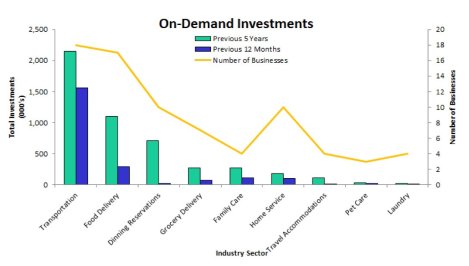This is part 2 of our Mobile, On-Demand series. (Part 1)
The rise of on-demand mobile services has been called the “uberification of the service economy” by Steve Schlafman of RRE and rightly so. The rapid growth of Uber has been a major driver in the complete embrace of this business model by the venture capital community. Thus, it’s only right that we start this series with an eye toward transportation.
(Credit: http://www.businessinsider.com/the-on-demand-economy-2014-7)
Transportation continues to be the center of on-demand activity and is the most mature of the on-demand sectors. In my research of >100 on-demand transportation startups, I have found a number of complex factors for the trends that we are seeing today, but for this part of the series, I will keep it high level. Rather than dive deep into specific issues, which we plan to do in the following posts, I thought the best way for me to share about consumer, on-demand transportation would be to do a flyover of the types of companies that I found throughout the process. To that end, I have outlined below 7 categories that I use to break down these startups and a few notes on each. I hope you find it informative!
Taxi Hailing
This is the category most people are familiar with. With a few clicks, you can have a taxi pick you up from any place where the services are provided. Uber and Lyft continue to dominate the news in the US market with their latest actions discussed at length in tech tabloids. Together, they have raised close to $2B in venture capital and private equity funding and have drawn the ire of the taxi establishment. Despite their dominance, newer companies continue to take aim. In an effort to stake their own claim, Hailo, GetTaxi, and others recently expanded into NYC and other marked territories but have found it too expensive to compete. Hailo, a taxi hailing startup based in London with over $100M funding, announced last week that it was pulling out of North America entirely. Others are siding with the taxi establishment. Flywheel, a startup based in SF with over $20M in funding, is offering taxi companies access to the same technology that Uber and Lyft offer their drivers. By aggregating demand through Flywheel’s app, taxi companies can reduce the costs of handling logistics on their own, but they will have to give up control of their platform and see margins drop as the playing field is leveled. There are a number of companies imitating the Uber model outside of the US, but we can save that for a future post.
Dynamic Carpooling
This category is often lumped with Taxi Hailing, but it is fundamentally different. While taxi hailing relies on fleets of professional drivers, dynamic carpooling is focused on peer-to-peer sharing, maximizing the utilization of personal automobiles. SideCar, Getaround, and RelayRides have been around for several years and are the giants in this space. There has been interest in dynamic carpooling for quite a while now, with significant funding rounds for each of these companies and even early-stage acquisitions taking place (e.g. Hitch, Zimride), but these services have failed to catch on in the way of on-demand, taxi hailing. In Europe, however, dynamic carpooling has become incredibly popular with BlaBlaCar, based in Paris, and Carpooling.com, based in Munich, dominating the scene.
Shuttles
The on-demand shuttles category has its roots in Big Tech. With Google buses delivering commuters back and forth between SF and South Bay, other established companies and well-funded startups, eager to please their engineering and product talent, began following suit. Whisk, RidePal, Bridj, Leap Transit, and Chariot all compete here. Some in this space purport to disrupt the public bus systems, but these generally tend to be costlier alternatives focused on the young technorati. It remains to be seen whether these companies can offer a service that is interesting outside of the Silicon Valley bubble world.
Fleet
This category lumps startups together that require a fleets of transportation vehicles for their on-demand services. SilverCar is a well-funded company with a very popular service that is making renting cars much more hassle-free. Bike sharing is also part of this category, with Bixi, Spinlister, and Zagster competing in the space. Scoot Networks is a startup that has even raised over $4M to do the same with scooters.
Multi-modal
With the introduction of so many transportation options, some companies have made their mark in organizing them. RideScout (recently acquired by moovel) and RedRide currently fill this niche, allowing a person to plan out trips with a variety of available transportation options. Moovit has been a dominant international player in aggregating public transportation options, as well.
Parking
A number of parking and valet companies compete in the on-demand parking space: ParkMe, SpotHero, Parkopedia, ParkWhiz, Streetline, Parking Panda, Pango, Zirx, and Curbstand have all received venture capital funding, just to name a few. One of the most interesting startups in thie parking space has been FlightCar, which provides free parking for those at the airport who are leaving and rents out their cars to those who are arriving. Flightcar, founded in 2012 by three 18 year old co-founders, recently closed a $5.5M round.
Travel & Tourism
These startups focus on reducing the pain of traveling by reducing its two biggest stressors – costs and time spent in planning. One of the hottest opportunities has been in providing cheap alternatives to booking traditional hotels. AirBnB, HotelTonight, and Couchsurfing are each unique players in the space and are worth a look for those who are still unfamiliar. Breather, based in Montreal, is an interesting company that rents out quiet, meeting space in big cities on-demand. Sincerely (producer of Postagram) and TouristEye are two tourist-focused startups that made a mark and have been acquired early, while RoadTrippers continues to grow as an independent tourism planning service with on-demand features.
Up next: household services!



Reblogged this on Alex Gold and commented:
fascinating read